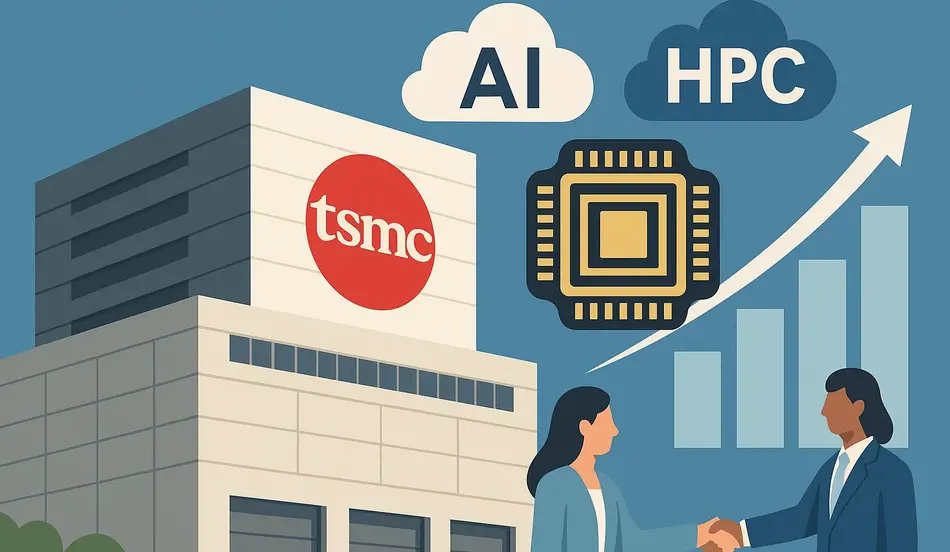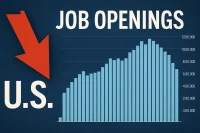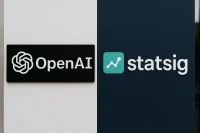The semiconductor industry is witnessing unprecedented demand for advanced chips, with Taiwan Semiconductor Manufacturing Company (TSMC) at the forefront of this technological revolution. Despite currency headwinds from a stronger Taiwan dollar, TSMC remains firmly on track to achieve its projected 25% revenue growth in US dollar terms this year, powered primarily by artificial intelligence and high-performance computing applications.
AI and High-Performance Computing: TSMC’s Growth Engines
TSMC’s recent monthly sales figures have demonstrated remarkable strength, reassuring investors and market analysts about the company’s trajectory. The robust performance isn’t surprising to industry insiders, but it confirms that the semiconductor giant continues to capitalize on two of technology’s most powerful trends: artificial intelligence and high-performance computing.
Steady Demand Despite Economic Pressures
The company’s products are priced in US dollars, creating a natural headwind when the Taiwan dollar strengthens. However, this currency pressure has done little to slow TSMC’s momentum. The underlying demand for AI and high-performance computing chips has remained so strong that the company continues to post record results despite these challenges.
According to industry analysts at TechInsights, “The semiconductor market is experiencing unprecedented demand for advanced nodes driven by AI applications, with TSMC capturing the lion’s share of this growth due to their technological leadership.”
Q2 Expectations: Another Record-Breaking Quarter
As TSMC prepares to release its Q2 financial results next week, market expectations are high. Analysts are anticipating another set of record-breaking numbers, both in terms of top-line revenue and bottom-line profitability. This optimism is well-founded, given the company’s consistent execution and the seemingly insatiable market demand for advanced semiconductor technology.
TSMC’s Strategic Position in the AI Revolution
TSMC’s dominant position in advanced semiconductor manufacturing has placed it at a critical juncture in the AI revolution. As companies worldwide race to develop and deploy AI solutions, the demand for specialized chips has skyrocketed.
Manufacturing Partner to AI Giants
As the world’s leading semiconductor foundry, TSMC manufactures chips designed by AI leaders like NVIDIA, AMD, and Apple. The company’s advanced process technologies, particularly its 5nm and 3nm nodes, are essential for creating the high-performance, energy-efficient chips that power modern AI applications.
Research from Semiconductor Industry Association indicates that AI chip demand is expected to grow at a CAGR of over 30% through 2028, positioning TSMC for continued strong performance.
Investment in Advanced Manufacturing Capacity
To meet the growing demand, TSMC has been aggressively expanding its manufacturing capacity. The company has committed billions of dollars to build new fabrication facilities in Taiwan, Japan, and the United States. These investments not only address current demand but position TSMC to capitalize on future growth in AI and high-performance computing applications.
Currency Challenges: Navigating the Stronger Taiwan Dollar
While TSMC’s growth story remains compelling, the company does face challenges from currency fluctuations. Since TSMC’s products are priced in US dollars but many of its costs are in Taiwan dollars, a strengthening local currency can pressure profit margins.
Impact on Financial Performance
When the Taiwan dollar strengthens against the US dollar, TSMC’s revenue in local currency terms doesn’t grow as quickly as it does in US dollar terms. This can create a perception of slower growth when looking at financial statements denominated in Taiwan dollars.
Mitigation Strategies
TSMC employs various financial strategies to mitigate currency risks, including:
- Natural hedging through US dollar-denominated expenses
- Financial hedging instruments
- Geographic diversification of manufacturing facilities
- Long-term pricing agreements with major customers
These approaches help insulate the company from short-term currency fluctuations while allowing it to focus on its core business of semiconductor manufacturing.
Market Confidence in TSMC’s Growth Trajectory
The strong monthly sales figures have bolstered market confidence in TSMC’s growth story. While there was little doubt about the company’s performance, the consistent execution reinforces investor belief in the semiconductor giant’s ability to capitalize on AI and high-performance computing trends.
Analyst Perspectives
Market analysts have maintained overwhelmingly positive ratings on TSMC stock, with most rating it as a “buy” or “strong buy.” The consensus view is that TSMC’s technological leadership, combined with strong secular growth trends in AI and high-performance computing, positions the company for sustained growth.
Competitive Advantages
TSMC maintains several competitive advantages that support its growth trajectory:
- Technological leadership in advanced process nodes
- Scale advantages from being the world’s largest dedicated semiconductor foundry
- Strong relationships with leading technology companies
- Diversified customer base across multiple industries
- Significant barriers to entry for potential competitors
These advantages help explain why TSMC continues to outperform the broader semiconductor industry and why investors remain confident in its future prospects.
Hiring?
Post semiconductor and AI technology jobs on WhatJobs – Find qualified candidates with the skills to drive innovation and scale your tech teams.
Post a Tech Job NowFuture Outlook: Sustained Growth Beyond 2023
Looking beyond the current fiscal year, TSMC’s growth prospects remain bright. The company is well-positioned to benefit from several long-term trends in the technology industry.
Expanding AI Applications
As artificial intelligence continues to penetrate more industries and applications, the demand for specialized AI chips will grow accordingly. From autonomous vehicles to healthcare diagnostics, AI applications require increasingly sophisticated semiconductor solutions.
Next-Generation Computing Architectures
High-performance computing is evolving beyond traditional CPU-based architectures to include specialized accelerators, GPUs, and custom silicon. TSMC’s advanced manufacturing capabilities make it the partner of choice for companies developing these next-generation computing platforms.
Global Digital Transformation
The ongoing digital transformation across industries continues to drive demand for semiconductor content in products and services. As more devices become connected and intelligent, the semiconductor content per device increases, benefiting TSMC as the leading manufacturer.
Explore job opportunities in artificial intelligence on WhatJobs
FAQ About TSMC’s AI and Computing Revenue Growth
How is AI driving TSMC’s revenue growth?
AI applications require specialized, high-performance chips manufactured using advanced process technologies. TSMC is the leading manufacturer of these advanced chips, producing semiconductors for companies like NVIDIA, AMD, and other AI hardware leaders. The exponential growth in AI deployment across industries has created unprecedented demand for these specialized chips, directly contributing to TSMC’s projected 25% revenue growth. As AI continues to evolve and penetrate more sectors, TSMC’s AI-related revenue is expected to grow even faster than its overall business, potentially accounting for over 30% of total revenue within the next few years.
What challenges could impact TSMC’s AI computing revenue growth?
While TSMC’s AI computing revenue growth looks promising, several challenges could impact its trajectory. Currency fluctuations, particularly a stronger Taiwan dollar, create headwinds since TSMC’s products are priced in US dollars. Geopolitical tensions between China, Taiwan, and the United States pose strategic risks to TSMC’s operations. Competition from other foundries like Samsung and Intel, who are investing heavily to catch up in advanced process technologies, could pressure TSMC’s market share. Additionally, potential supply chain disruptions or shortages of critical materials could temporarily constrain TSMC’s ability to meet the growing demand for AI chips. Despite these challenges, TSMC’s technological leadership and scale advantages position it well to maintain its growth trajectory.
How does TSMC’s manufacturing capacity affect its ability to meet AI chip demand?
TSMC’s manufacturing capacity is a critical factor in its ability to capitalize on AI chip demand. The company has been investing aggressively in expanding capacity, with planned capital expenditures exceeding $40 billion annually. These investments include new fabrication facilities in Taiwan, Japan, and the United States, specifically designed to produce the advanced nodes (5nm, 3nm, and beyond) required for AI chips. TSMC’s capacity expansion strategy is directly aligned with projected AI chip demand growth, ensuring it can serve customers like NVIDIA, AMD, and Apple without significant supply constraints. This capacity advantage creates a virtuous cycle where TSMC’s ability to fulfill orders attracts more customers, generating more revenue for further capacity investments.
How does TSMC’s revenue growth compare to overall semiconductor industry trends?
TSMC’s projected 25% revenue growth significantly outpaces the broader semiconductor industry, which is expected to grow at 7-10% annually over the next few years. This outperformance is primarily due to TSMC’s dominant position in advanced process technologies required for AI and high-performance computing applications. While the overall semiconductor market experiences cyclical patterns, TSMC’s focus on cutting-edge technologies has allowed it to grow consistently even during industry downturns. The company’s revenue growth is also more stable than many semiconductor companies because of its diversified customer base across multiple end markets. As AI computing continues to represent a larger portion of semiconductor demand, TSMC’s growth premium over the industry average is expected to persist.
The semiconductor industry’s future looks increasingly tied to artificial intelligence and high-performance computing, with TSMC perfectly positioned to capitalize on these trends. As the company prepares to announce another record quarter, investors and industry observers alike can take comfort in knowing that the fundamental drivers of TSMC’s growth remain firmly intact. Despite currency challenges, the company’s technological leadership and strategic investments ensure it will continue to benefit from the AI revolution for years to come.




